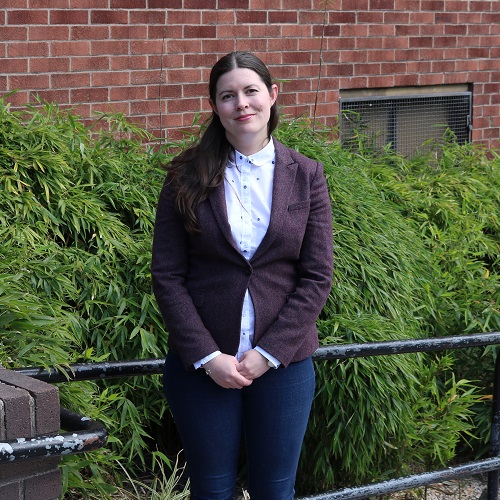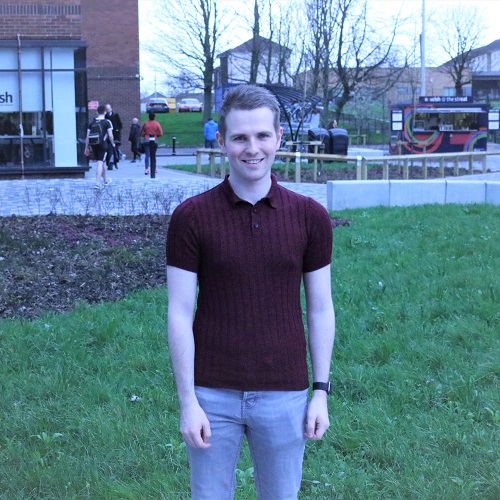
Study with usProfessional Graduate Diploma in Education (PGDE)
The Professional Graduate Diploma in Education (PGDE) prepares you to teach in locations worldwide.
We’ve mapped out the process for applying to the Professional Graduate Diploma in Education (PGDE) in detail below. Please read this information thoroughly before starting your application. This process applies to both the Primary Education and Secondary Education routes.
The PGDE is a well-recognised teaching qualification worldwide. If you wish to teach in another country you should contact the relevant education authority to check your eligibility.
1. Prepare: Watch our handy video guide ‘How to apply for the PGDE’ – this gives an overview the application process from preparation, to submission, to interview.
2. Is my subject open?: View our list of subjects. Check that the subject you are applying for is currently open to applications.

3. Review entry requirements: Visit the programme page for the subject you're applying for and review the entry requirements. Do you meet these? If yes, continue to apply for the current cycle. If no, sign up to be notified with any upcoming events as you work to meet entry requirements for the next cycle.
Each of our subject pages provides information on what exactly is required as a minimum requirement for entry. To request a free transcript check, please email a clear, good-quality copy of your degree transcript to hass-pgde-selection@strath.ac.uk for review.
4. Personal statement: Prepare your personal statement, see UCAS personal statement guidance and top tips and our PGDE Personal Statement Guide. Make sure to tell us about any teaching experience you have, what you learned and why this inspired you to become a teacher.
Applicants aspiring to be a teacher should show that they:
- are committed to the professional values of social justice, integrity and trust and respect
- can understand what it means to be a trusted teacher and have a willingness to engage with the Code of Professionalism and Conduct
- are self-directed and resilient
- are interested in developing an understanding and awareness of the current context of education in Scotland
- are capable of meeting the Standard for Provisional Registration which specifies what is expected of a student teacher at the end of the ITE who is seeking provisional registration with GTC Scotland.
5. Gather references: You need to provide one referee if you are applying via UCAS and two if you are applying directly to the university, so ask them well in advance for their permission and make sure they understand your choices, motivations and the application process.
Your application can't be processed until the reference has been received, so you may need to follow up on progress. If you have been in a school, then it is a good idea to ask the Head Teacher or teacher you have been working with, as they can comment on what you have been doing and how you have contributed to the work of the class.
If not, then you could ask someone who has observed you working with children / young people. Please note that your referee cannot be a family member or friend. Although a reference from a school will provide a clearer picture of what you have to offer it is not essential and, especially for recent graduates, an academic reference may be the most appropriate.
6. Apply: It's now time to apply. Hit the apply button on the subject that you're interested in and submit your application.
You should:
- apply through UCAS if you're applying for the full-time PGDE and you're from Scotland, England, Ireland, Wales or the European Union. Here’s a ‘how to guide’ for applying on UCAS.
- apply through our Direct Applications service if you're an international student or are applying for the part-time route.
Congratulations, you have now submitted your application! Find out what happens after you hit ‘submit’ on your PGDE application.
After you apply
Wait to hear
On submitting your application you should wait to hear from us. This will either be a decision via UCAS Track or our Direct Applications service, or, we may request more information from you.
Send additional information
If successful at the first stage of application, you'll receive an email requesting that you send documents to us. Please read the request thoroughly and don't send us documents until we request them.
Interview
If successful you'll be invited to an interview. Interviews will take place either online or in person depending on the subject you have applied for. This is an opportunity for you to showcase your passion for teaching and your subject, and for you to meet tutors. Please check your Junk folder to ensure an e-mail from us regarding your interview has not been missed.
Questions about PGDE study?
Join us at an upcoming webinar.
Course overview
The full-time PGDE at Strathclyde is 36 weeks in duration, split between 18 weeks on campus and 18 weeks on placement. There are three terms:
- Term 1: mid-August - Christmas
- Term 2: Beginning of January - Easter
- Term 3: Easter - early June
The course comprises separate modules that add up to 80 credits. Strathclyde recognises each 10 credits as being the equivalent of 90 hours of student effort. Of these, normally 24 hours will be contact with a tutor/lecturer.
School placements will also account for some of these contact hours. In addition, students will be required to undertake independent and supported study tasks.
The PGDE can also be studied part-time over two years for all secondary subjects, except for Physical Education and Technological Education. See our Frequently Asked Questions for full details.

Core classes
This course will equip you with the theoretical knowledge and practical skills you require to become a teacher. The PGDE is a modular course and students will study three modules across the year:
- Education Studies; Professional Values
- Professional Learning Through Enquiry
- Professional Skills
- Curriculum and Pedagogy
- Professional Practice
Students attend classes on campus followed by blocks of continued learning on placement in a school in Scotland. You'll have a chance to apply learnings from taught modules directly in the classroom during your school placements.
Your time on-campus time is used to familiarise you with the curriculum, allow you to collaborate with your PGDE peers and begin to plan lessons and develop materials. Students will have the opportunity to teach mini-lessons and explore innovative and motivating ways of engaging children and young people.
In this module, you'll explore the theoretical underpinnings of education. You'll be encouraged to engage with issues of the nature and the purpose of education, social justice and equality, and practice and policy in relation to ethical and political ideas. Throughout this module, we aim to disrupt and expand your thinking about education. You'll be asked to reflect on your values and beliefs in relation to a range of educational questions and issues and you will be presented with questions designed to challenge and refine your current thinking.
The module will give you opportunities to consider how theoretical underpinnings relate to the classroom; how your developing understanding translates into the education context; and how your own values and beliefs interact with your developing professional identity. Human Rights and Learning for Sustainability together form the basic architecture of this module.
This module aims to develop students as enquiring self-reflective practitioners who are able to work collaboratively to develop skills, knowledge and expertise in an area of professional practice. Students will be supported to develop as autonomous, transformative leaders of change. Across the globe there is a growing call for education systems to be responsive to the increasingly dynamic, complex and fast-changing nature of society. Through this module, students will develop the skills and expertise necessary to respond to the changing circumstances of the learning communities they encounter.
- Curriculum and Pedagogy
- Professional Practice
Taught both on campus and in schools, this module will enable you to become an effective teacher through learning pedagogical theory, observing experienced teachers and applying your knowledge and understanding in the practical context.
Placement
School placements are an integral part of the learning experience when completing the PGDE. It gives you the opportunity to make connections between on-campus learning, academic reading and practical experience in schools. Placement mainly involves observing, assisting and teaching in classes.
During placement you're supported by experienced classroom practitioners and gain an insight into the complexities of the teacher's role. You're guided through planning, assessing and evaluating lessons and encouraged to become self-regulated learners who have a good understanding of the importance of career-long professional learning.
Students on the PGDE Primary Education course complete three placements split across three different schools:
- Placement A: Primary 2-4 - (6 weeks, Semester 1)
- Placement B: Primary 1-ELC (2 weeks, Semester 1)
- Placement C: (10 weeks, Semester 2)
Students on the PGDE Secondary courses complete two placements. This is split across two schools.
- Placement A: School 1 (8 weeks, Semester 1)
- Placement B: School 2 (10 weeks, Semester 2)
How am I placed?
Placements are allocated through the Student Placement System (SPS), normally within the nine West Partnership local authorities. This system is used nationally for ensuring that student teachers, throughout Scotland, have access to school experience. SPS is automated and is administered by GTC Scotland and works on the principle of matching students to schools, based on the information provided by universities, local authorities and schools.
You should not normally be required to travel in excess of 90 minutes each way to your school placement, from your stated address. All placements are arranged via SPS, you're not permitted to seek placements independently.
How am I assessed while on placement?
You're continually assessed while on placement and must keep a portfolio of progress. This placement file will form part of the evidence of your meeting the Standards for Provisional Registration and prepares you for the continuation of professional development during your professional teaching career.
What is expected of me while on placement?
You must attend your placement school throughout the full working day. You must also attend school on staff in-service days, unless told otherwise by your school.
You'll be expected to undertake a series of tasks during placement as well as, increasingly, take responsibility for teaching, under the supervision of school staff. The tasks will encourage you to draw on the in-faculty components of the programme, relating principles and practice within a relevant context.
Schools look for a variety of characteristics and will use the Standards for Initial Teacher Registration for assessment purposes, but it's fair to say that schools look for students who are enthusiastic, confident, hard-working, experimental, willing to listen and respectful; in addition, a little humility – in the best possible sense – goes a long way too!
After your PGDE
After achieving the award of PGDE, you will have met the Standard for Provisional Registration set by the General Teaching Council for Scotland (GTCS). There are two routes to meeting the standard for full registration.
Teacher Induction Scheme (TIS)
Students from Scotland, other parts of the UK and the Republic of Ireland, who are studying at a Scottish Higher Education Institution are eligible to join the Teacher Induction Scheme (TIS).
The Teacher Induction Scheme (TIS) provides a guaranteed 1-year training post in a local authority to every eligible student graduating with a teaching qualification from one of Scotland’s Higher Education Institutions.
GTC Scotland is responsible for the administration of the scheme, on behalf of Scottish Government.
The scheme is not compulsory; you can choose to follow the Flexible Route instead. TIS allows probationer teachers to be considered for Full Registration within one school year (190 teaching days). It offers several benefits, including:
- a maximum class contact time of 0.8 full time equivalent (GTC Scotland endorsed)
- dedicated time set aside for Professional Learning
- access to a teacher with Full Registration for support throughout the induction year.
Flexible route
The Flexible Route is a way to complete probationary service for teachers who:
- have decided to opt out of the TIS
- are not eligible to join the TIS
- cannot commit to a full-time post
- elect to complete their probationary year somewhere other than a Scottish state school
Further information on the TIS and Flexible Routes can be found on the GTCS website.
Our subjects
At Strathclyde, we offer a wide range of subject specialisms as part of the Professional Graduate Diploma in Education (PGDE). In some cases, it's possible to specialise in two subject areas. If you choose to specialise in Primary Education, you'll also be qualified to teach in an early years setting.
Art & Design
Open to all applicants
Biology with Science
Open to all applicants
Business Education
Open to all applicants
Chemistry with Science
Open to all applicants
Computing Science
Open to all applicants
English
Open to all applicants
Gaelic
Open to all applicants
Geography
Open to all applicants
History
Open to all applicants
Home Economics
Open to all applicants
Languages
Open to all applicants
Mathematics
Open to all applicants
Modern Studies
Open to all applicants
Physical Education
Closed to Scottish Applicants. Open to Rest of UK and overseas applicants
Physics with Science
Open to all applicants
Primary Education
Open to all applicants
Psychology
Open to all applicants
Religious Education
Open to all applicants
Technological Education
Open to all applicants
Our students

Nicole O'Rafferty
It may seem scary, and it is a big decision to make... but so worth it! Prepare for a difficult year, but with the level of support you'll get from your tutors and friends, you'll be sorted!

Quinn Thurston
One of the biggest draws for me was that I could do my degree in under a year here whereas in Canada a post-graduate degree in education is two years in nearly every university. I didn't want to go back to school for another two years, I felt my career was already underway and so Strathclyde's single year program was the only one that felt right to me.

Samantha Wilson
If you are committed to being a great teacher Strathclyde is a good place to be. The PGDE offers a lot of support for its students and has a very experienced team of educators to help you navigate the course. The one piece of advice I have for anyone considering taking the course is to try and get as much classroom experience as you can before you start.

Connor Niven
Since being a teacher is such an important job, I wanted to give myself the best start possible and thought that studying at the University of Strathclyde would be a good foundation for the rest of my career.
Why choose Strathclyde?
Our teaching degrees have a strong track record and are highly valued by our students. Our graduates are sought after by schools around the world. We trace our history back to 1837, when David Stow founded one of the first teacher education institutions in the UK.
The PGDE is the graduate entry route to those who want to become a Primary or Secondary teacher in Scotland. The PGDE is an internationally recognised qualification, newly qualified teachers will be able to apply for qualified teacher status (QTS) or equivalent in their home country.
Teaching is one of the most rewarding careers you can pursue. It allows you to share your passion for your subject whilst motivating and inspiring young people to succeed in learning and in life. Every day will be different and bring new challenges to rise to. For enthusiastic, motivated individuals, it's a huge privilege to play a key role in shaping the lives of young people.
Why study the PGDE at Strathclyde?
- we’re the largest provider of Initial Teacher Education in Scotland
- opportunity to achieve 80 Masters-level credits
- learn through taught classes and 18 weeks of placements in a school in Scotland
- become qualified to teach in locations worldwide
- option for Scottish students to join the Teacher Induction Scheme (TIS) providing a guaranteed teaching job for a year following qualification, in a Scottish school
- as a newly qualified teacher, you can receive an additional financial enhancement in the region of £8,000 under the Preference Waiver Scheme
Contact us
Prospective student enquiries
Contact a member of our team on LiveChat between 10am and 4pm (GMT)
Telephone: +44 (0) 141 444 8600
Further information

Mairi McLean
The staff at my placement schools were incredibly encouraging, offering guidance and feedback that helped me to develop my teaching practice. It was quite nerve-wracking at first, especially when learning how to lesson plan effectively and managing the classroom environment, but over time I started to feel much more confident.

Bethan Pennie
My experience on placement was overwhelmingly positive. I was well-supported by my mentors and faculty members across both placements and thoroughly enjoyed the classes I was given to teach. I feel I adapted to the workload aspect of it fairly quickly and was producing lessons I felt genuinely proud of.

Niall Cook
As a Physical Education student, the facilities at Strathclyde were absolutely first class. We had access to genuinely world class equipment and areas to work in, which meant that we had immediate opportunities to put our learning into practice.